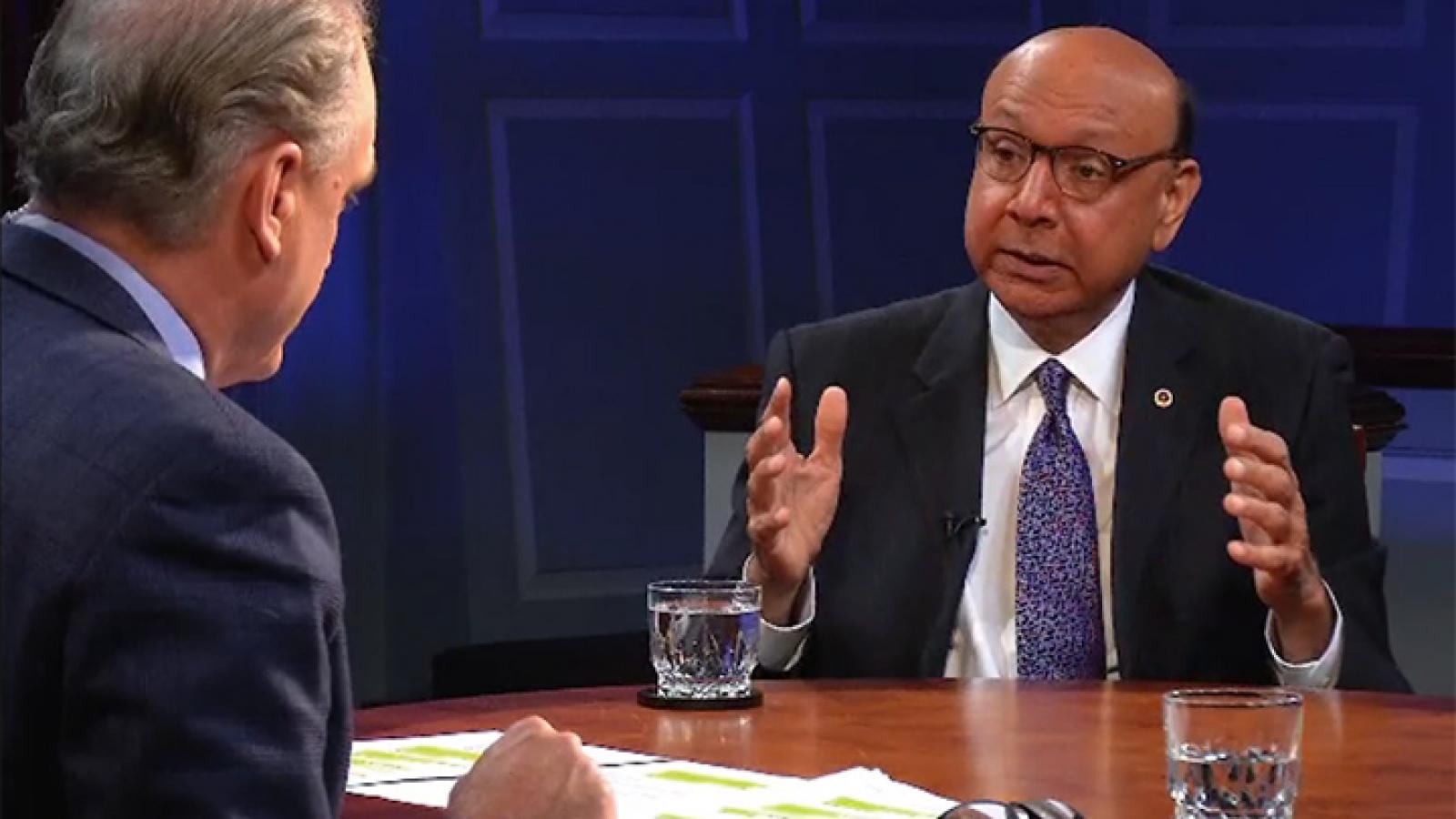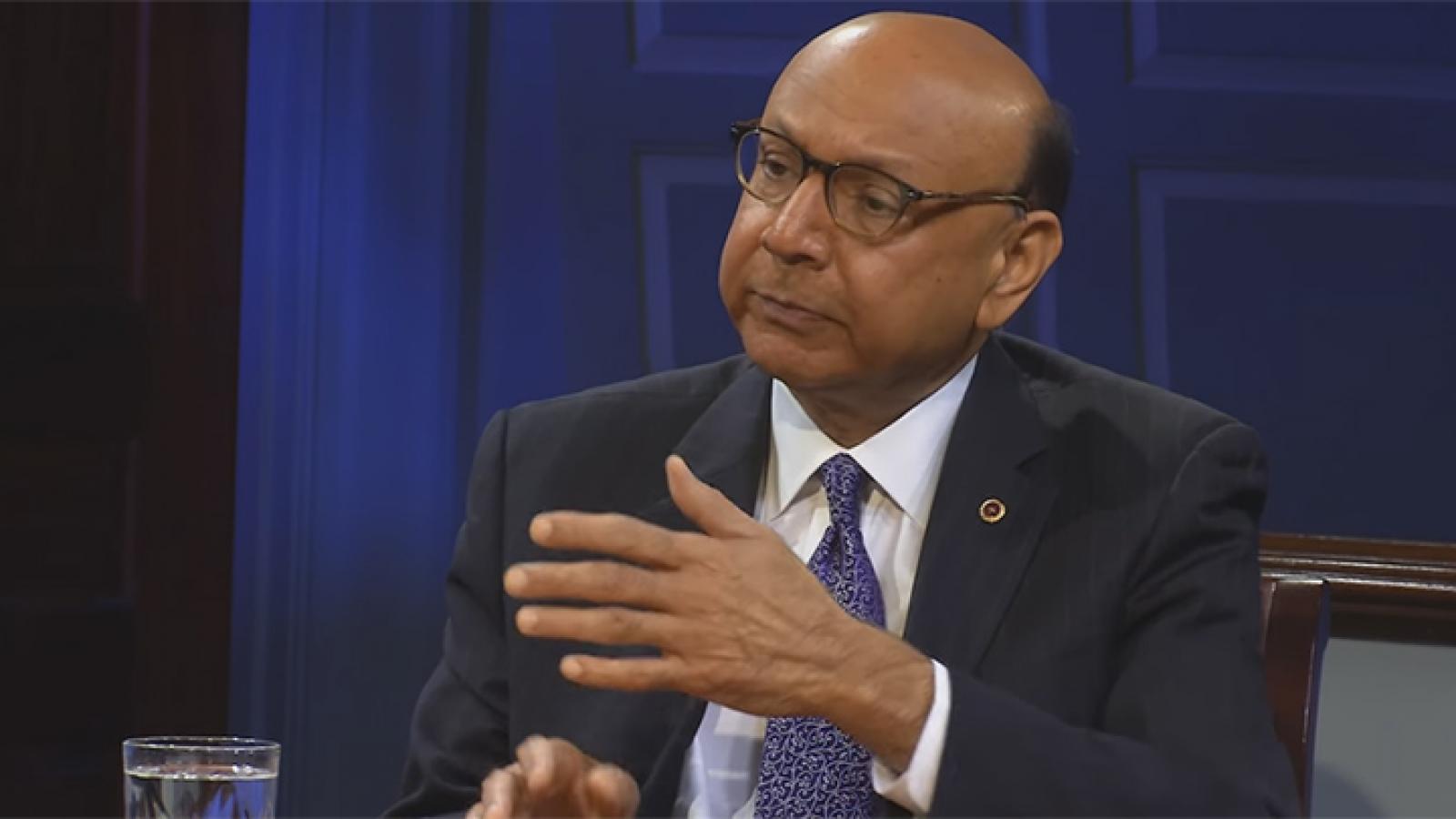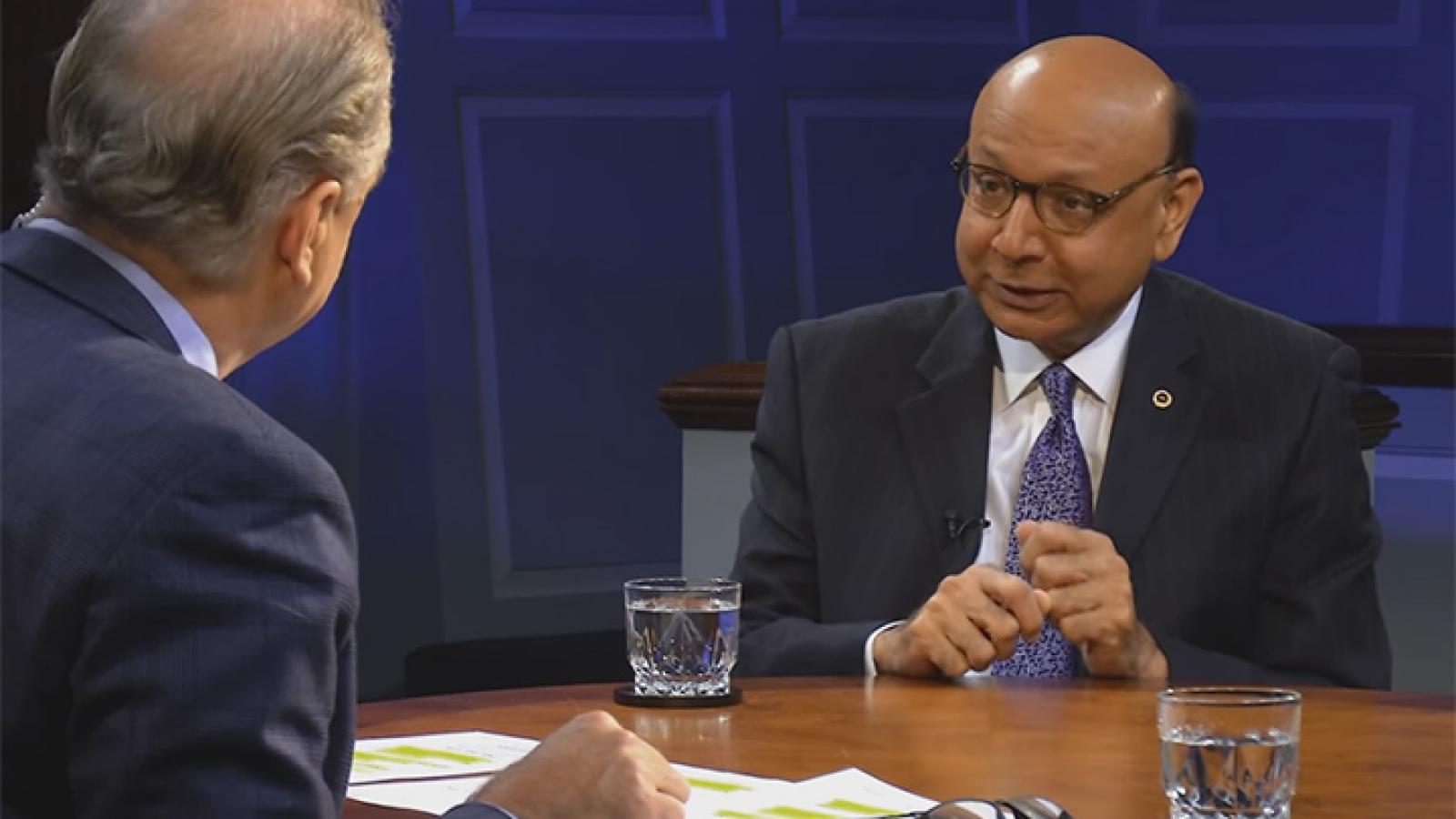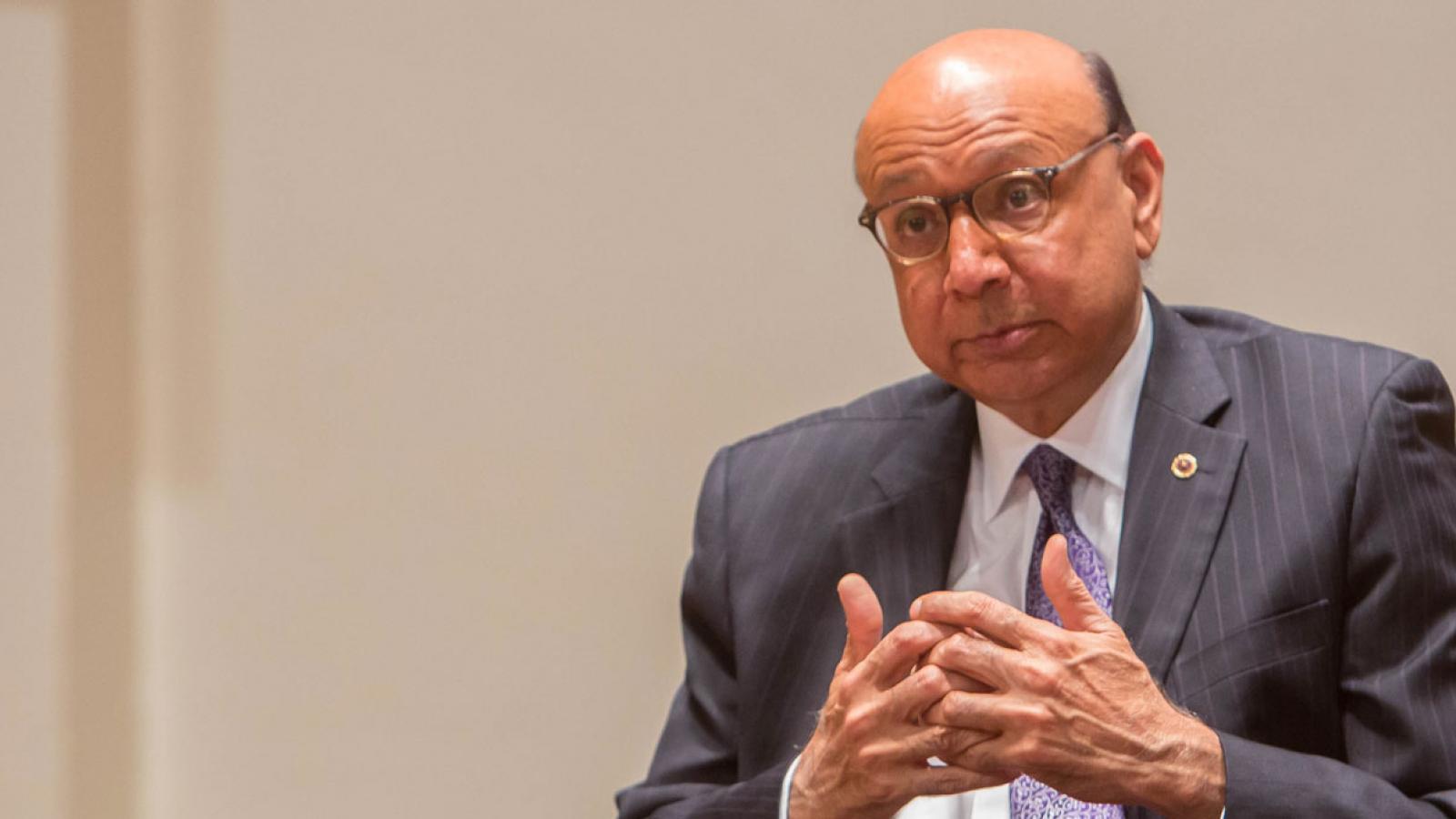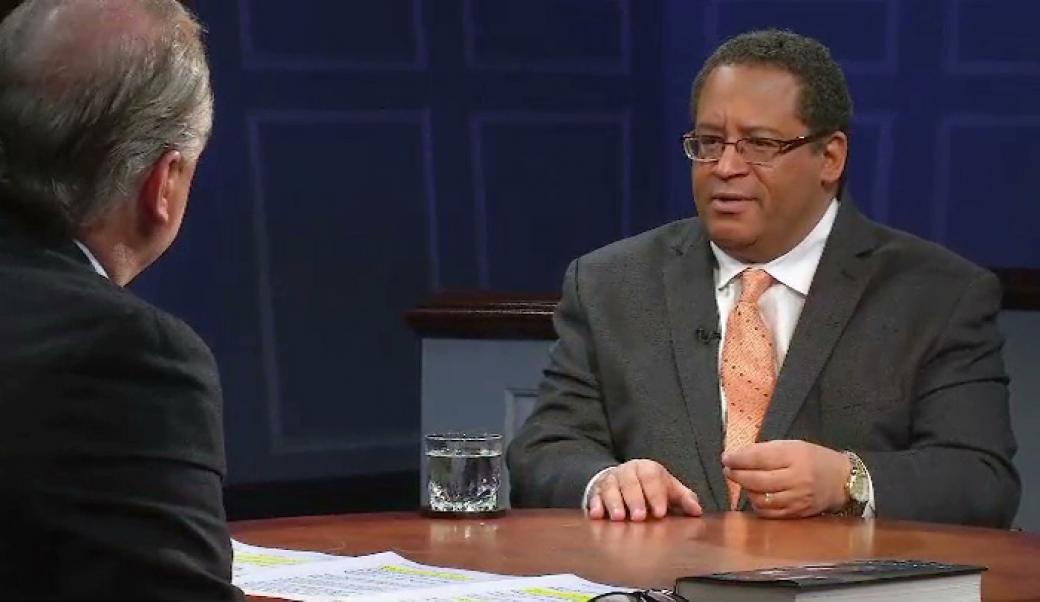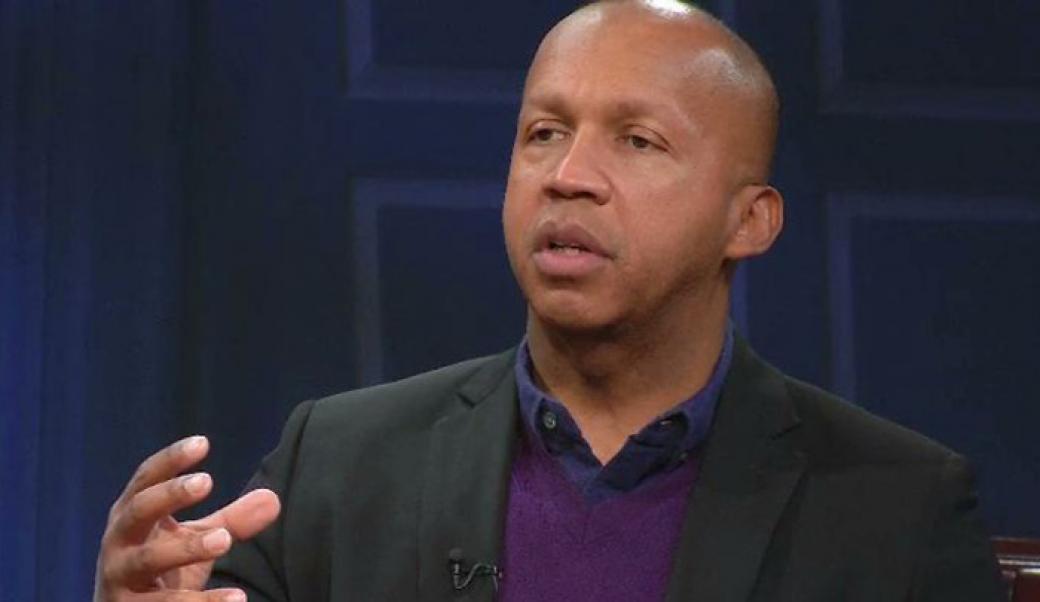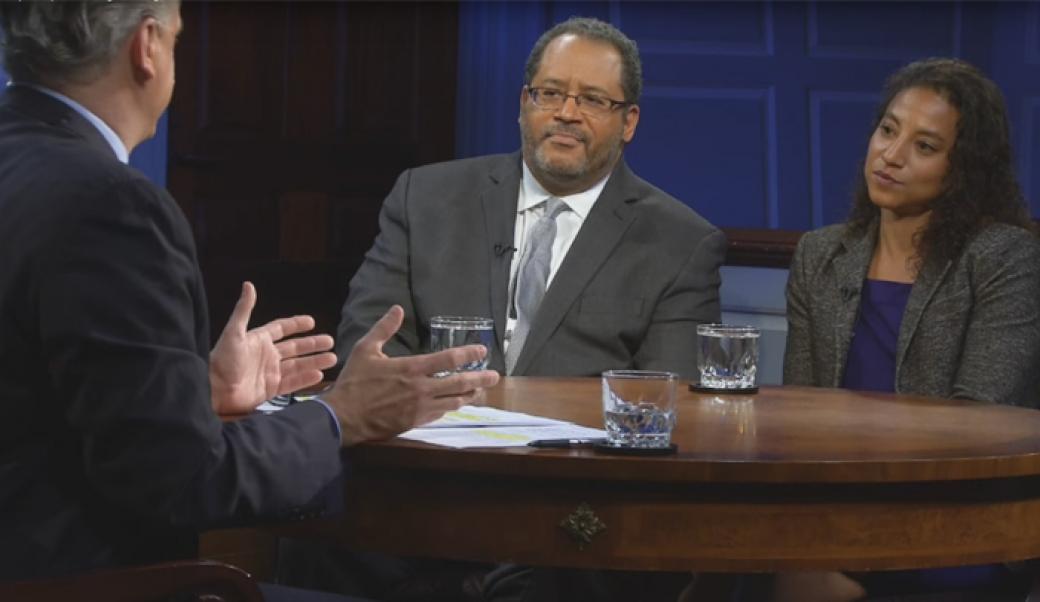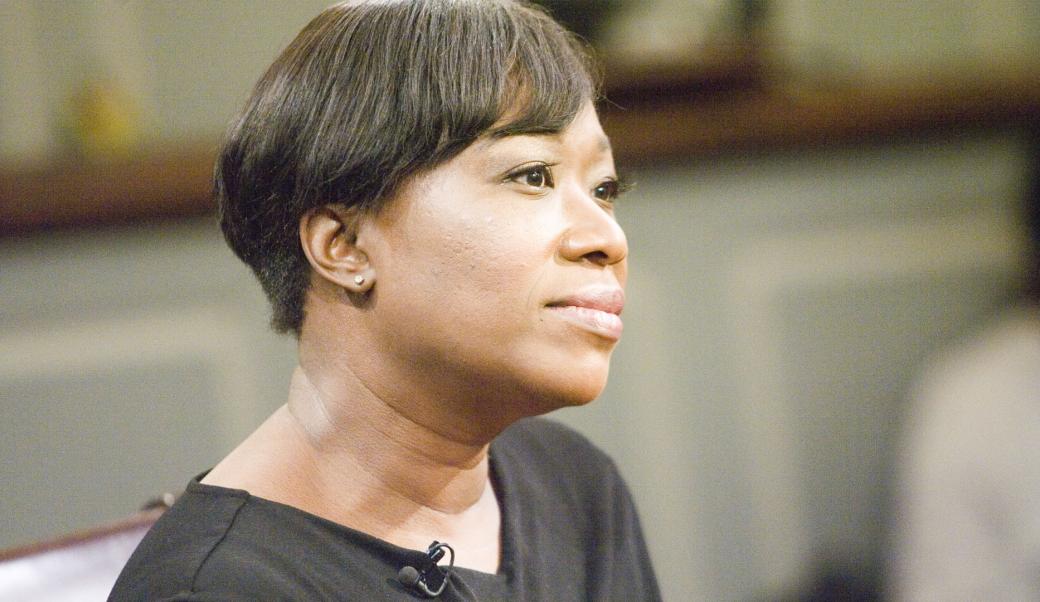About this episode
November 11, 2016
Khizr Khan
Muslim American Gold Star father Khizr Khan on the death of his son in Iraq, his speech at the 2016 Democratic National Convention, and the election of 2016.
Race and Racism
To be Muslim in America
Transcript
Douglas Blackmon: Welcome back to American Forum. I’m Doug Blackmon. On the final day of the Democratic National Convention last summer, Americans were introduced to a previously obscure man with no real history in politics. His name is KAH-ZEER (Khizr) Khan. Born in Pakistan, a lawyer, an immigrant who with his wife Ghazala became American citizens in 1986, attended Harvard University, raised a family of three boys, one of whom, named Humayun, became a soldier. And then in 2004 was tragically killed as a U.S. Army captain while saving his unit from an attack by two suicide bombers in Iraq. At the Democratic Convention, Mr. Khan castigated Republican nominee Donald Trump for his assertion that all Muslims should be banned from entry to the United States. Standing with his wife beside him, Mr. Khan's speech criticizing Mr. Trump for intolerance electrified the convention, and became a landmark moment in the 2016 presidential contest. Public response to Mr. Trump's subsequent comments about Mr. Khan and what were perceived as condescending remarks toward Mrs. Khan and their grieving gold-star family, inflicted heavy damage on Mr. Trump's popularity. There were also harsh rebukes—many of them false—lobbed at the Khans. But something bigger happened too. For an enormous number of Americans, Kah-Zeer Khan emerged as more than just another voice in a bitter election season. He became a deeply sympathetic representative of millions of law-abiding, patriotic Muslim Americans in communities throughout our country. For millions, he was the first such personal symbol to capture their imaginations and convey the contradictory sense of patriotism, injustice, and anxiety felt in recent times by so many Muslims in our country. The election is over now, and we've invited Mr. Khan to join us for a conversation about his story—but more focused on the future. On the America he hopes to live in going forward. The country he hopes to see his grandchildren born into. It's an honor to be with you.
Khan: Likewise, thank you for inviting me. What an honor to be guest of American Forum.
Blackmon: Until the time the Clinton campaign approached you been focused on her candidacy? Obviously you had heard remarks by Mr. Trump that troubled you and things that others had said. But did you consider yourself a politically active person at that time?
Khan: Not at all. We are very private people and we have always led private lives. Of course we have had our political preferences based on issues and based on people that we have in the past voted as Republican and we have voted in the past as Democrat, based on our preferences and depending on the issues that we feel strongly toward. We had visited some of our friends and some friends that have small children. Whenever we would go to visit them or they would come to visit us, their children would ask their children would ask me, because I’m an attorney, their children would ask me a question. Are we going to be thrown out of this country? Are our parents going to be thrown out and we are going to be left alone here? Five years old. Six years old. Eight years old. They had asked that question and that had bothered us. I would try to assure them; I know law a little bit. I’m not a constitutional lawyer, but I know the law, that that is not true. There are safeguards in Constitution of United States. But because they are scared, that statement would not do any good. Parents will tell us that they don’t do any homework. They go to school and uh our class fellows bully us and say “well, you are bad people, you will be thrown out of here anyway.” That was, to be considered that, should we go, we decided that we will go. We would say that was the reason that we said, uh behind those statements, such were the thoughts.
Blackmon: And so then the Clinton campaign comes to you initially just wanting to do a presentation about your son. But then, as the convention grows nearer, if what I’ve read is correct, they then begin to ask for more involvement on your part and then ultimately say they would actually like you to appear on stage and give remarks. And then, did they suggest what you would say?
Khan: All those children’s worries and our observations were in the back of my mind, so I said let’s see if I could write something. And I wrote about six pages of my sentiments my thoughts.
Blackmon: More than two minutes …
Khan: I read those six pages to Mrs. Khan and she would be watching the clock, it would be 15 minutes, 20 minutes. And she said this is not going to work, you have to cut it down. So I will trim it and bring it down to 10 minutes. Not good. Eight minutes, not good. Five minutes, not good. Finally, we got to about two minutes and that was the decision that I will say those things. Waving of the Constitution wasn’t part of the original speech. It’s an interesting story. I have put on the coat and I’m walking out of the room and am checking my pockets. I feel that I have something in my pocket. I pull it out and of course it was the Constitution. And, we are walking in the hallway, I tell Ghazala, Mrs. Khan, that I have this Constitution in my pocket. Do you think it would be advisable to pull it out? She says, “You shouldn’t do that. Unless you take the permission from them.” So, I asked the producer in the green room that I want to do this when I reference the U.S. Constitution. And this is the senior producer and he is standing there. He walks toward me and stands right here so close to me and he looks at me. He says “Mr. Khan, are you sure you are going to do this?” I said yes. And his eyes welled. He tells me, “Do this. This is going to be such an impactful gesture. Do that.” Because of his experience, he could tell what impact it will have.
Blackmon: And it was. As I think I told you in the green room before we came on set. I was there that night too and I was there in a journalistic role following around another someone who was already a high-profile speaker, so I was back in that space at an earlier point. And the campaign was very closely paying attention to every single word of those remarks and there were debates about every possible change up until the last minute. But, you didn’t have that scrutiny. It sounds like that moment you just described was as much input as there was of any kind.
Khan: And I, you know, there had been allegations of oh this Constitution was placed in my pocket and all that. Look at the condition of this document. I highlighted, I put notes in it. These are some of Thomas Jefferson’s statements that he had made about our government and its system. And Justice Scalia’s statement and some of the phone numbers when I can’t find piece of paper I jot it down. So here are some of the dates that are important that I remember. Some of the dates underlined here. So, it always is in my pocket.
Blackmon: But then afterwards, some of the things that were said in response to that, Mr. Trump’s criticisms of you, the reference that he made to, that perhaps your wife wasn’t allowed to speak, but also push back of other kinds came back, there were people who, there were things published that you were an advocate of Sharia law, that you were being paid by the government of Saudi Arabia, that, uh that you practiced, that essentially your interest in all this was so that you could be in the business of helping people get visas, that high-income individuals can if they have a certain amount of money it’s easier to get a certain kind of visa. But so there was a great deal of response along those lines, just tell us how you reacted to that and clear up any of that, that you’d like to.
Khan: Oh I would very much like to know that you have invited me. First, I have never practiced immigration law. I’ve never sponsored anybody. Second thing, this Sharia law business is that those who allege that Sharia law or the fear of Sharia law, I want to invite them to read the United States Constitution one more time, one more time because they fail to understand the safeguards against any religious implications that exist already long time ago, so I invite them to read that so they will be heartened that that threat is bogus threat. There’s no room for that. The reason is that there is no such thing as Sharia law. The things that they imply because of their ignorance, most of the Muslim countries’ laws are based on the laws of the colonists that left, British French, Dutch, they left those laws in those countries combined with the local tradition, local laws, Islamic laws, hodge-podge of those laws. For example, I have a very, very significant case and I have testified many times, telling the U.S. courts even, not to give courtesy to the laws or the decisions of the Muslim countries because there is no equal status of litigants. If there is a man and a woman in the court of some of these countries, they are not treated equally, which is totally against the equal protection of the laws of United States. So if these folks that fear that Sharia is coming or Sharia law is coming at all, they are unfamiliar unfortunately, or some pretend to be unfamiliar with the precautions, with the safeguards that the United States system, United States legal system, and the Constitution has in place. So, so no fear about Sharia law. I had written an article about 25 years ago and some of the folks that criticized initially, once they read that article, I was trying to explain what are the sources of Islamic law, what are the sources that are considered when drafting Islamic law, and later on they themselves acknowledged that after reading this article, this is an academic article, this is nothing to do with in defense of Sharia or in defense of anything, so that’s that, being paid. Somebody sent me a link and a write that article, it’s written by a reporter out of San Francisco, and he pastes a deposit slip of $375,000 paid to me as alleged. So he pastes a deposit slip of the bank, $375, but the name of my law firm is R. J. Khan. My law firm’s name is not R. J. Khan’s Law and I go with K. M. Khan Law Office. So somebody pointed that, then there is another deposit slip, “oh this is the corrected version.” And even in the corrected version it says K. M. Khan Law Offices, and mine is K. M. Khan Law Office. So he writes at the bottom of that he said “people, get it right, at least second time get it right.” So it is that, there is no such thing, there is no connection. I wish they would have paid me. I wish they would pay me now, but there is no such thing. And I think we are, the matter is much more serious than myself or all these allegations.
Blackmon: As the presidential campaign began and Donald Trump, I guess he starts off with reference to Mexican immigrants and rapists, but it’s sometime after that before there’s a specific reference to Muslims. But when did you begin to pay close attention or to these ideas that were being expressed by him, and the reactions that you had.
Khan: Well we are citizens of this country with equal rights and two ears and eyes and we were listening and we were paying attention and then throughout the process of primaries when this candidate is making those statements, we’re dealing with, we’re listening to the complaints and the worries of these children and our relatives. One of our niece called us and she says that I wear this scarf on my head and I am coming back to United States after visiting and this statement has been made. Should I remove it when I arrive at United States? And I insisted and I told no, you must continue to wear what you choose to wear, there is no one who going to—but she said I am scared. This was telling us that somebody needs to stand up and say something and remind the country, and remind the nation, and remind the then candidates that there are safeguards and there are protections in the Constitution of the United States. So we were paying attention and we were listening and we were getting concerned about the direction of the political discourse, where it is taking us.
Blackmon: You’ve had what as result of all this became this astonishingly affirming experience of American values and the support that you’ve gotten. But even by your own description in the past many Muslim Americans and other minorities that you know have described these hateful things that were done or people being bullied or people’s reactions to some of the things said by Mr. Trump. Which he in his defense he has also tried to contain to some degree though it’s a little difficult to tell. But so there have been these instances in the past. Did you experience instances in the past where you felt America was not being particularly open to a Muslim immigrant?
Khan: I don’t want to sound that I am not telling you the truth, but I’m telling you the truth if you ask Mrs. Khan she will tell you exactly the same thing, if you ask our children they will tell you exactly same thing. We have been fortunate that we have not experienced what other Muslims may have experienced. Our experience in the United States being the citizens being the immigrant citizens have been very positive from day one. Very first day when we arrive here and Mrs. Khan will tell you, we had two small children, Shaharyar and Captain Humayun, three-year and two-year-old. We offloaded our luggage. I had rented a small one-bedroom apartment. We are hauling our stuff into that apartment from the car. Few minutes after we close the door and we are trying to open the boxes, there is a knock at the door and a neighbor with two sacks of groceries standing at the door. And she said we just saw that you have small children and you just came and all that and we brought this for you.
Blackmon: And this was long ago?
Khan: First day in the U.S. in 1980. And we received it we spoke with her and she said I’ll let you rest you must be tired and all that if you need anything we are next door. Five to ten minutes after that there is another knock at our door. There is another lady with an ice box, milk, water, other things so we know that you have just arrived and we have brought this for you. Please let us know if you need anything else. They did not ask us what religion you have. They did not ask where you came from. Out of the goodness of you heart, out of the generosity of their heart they came to help a neighbor. It is that, that is what we have experienced. That is deep down in our heart the gratefulness. So you will say this must be a perfect place on earth? Not at all, there is so much room make it better. So much room to make it better, and I agree and I admit we all must work to make it better. But that has been our experience, very positive generous. This institution where we are sitting at University of Virginia had been so generous to us, to my family, to our children. Not only has it given us education but it has taught them value of public service. It was that value that kept Humayun Khan as hero of this country today. It is that value that was taught to him right here under the four walls of this wonderful institution. So we have been blessed in our experience had been very positive, not to deny that other Muslims have not experienced. Yes, they do, they have, they speak to me, they speak to us. My solution to that type of conversation that type of hatred is one interfaith relation. And this is my experience throughout the country wherever there is stronger interfaith relation, there is less hatred. Somehow 1.6 billion Muslims in the world have been quiet throughout these 15–20 years. They have been standing on the sidelines and let a small number of really small number of criminals and terrorists of violent people define the religion. That is not acceptable anymore. I have implored. I was in Chicago and I spoke to about 20,000 Muslims present there and I told them that no more standing quiet you must denounce terrorism you must denounce violence. You must tell the world this good religion good faith had been hijacked, prorated, and presented to the world. Unless we do this, world will continue to see us through the activities and through the actions of these violent and terrorist people.
Blackmon: I want to ask you one more complicated question. There have been many, many Americans who have been so terribly traumatized by these events that are associated perhaps unfairly, but directly with radical kind of Islam. I, myself, a close friend of mine was captured by Al-Qaeda years ago and murdered. And so then the Republican convention before you spoke, the mother of one of the men killed in Benghazi who spoke very powerfully, and uh harshly but so your son died as a result of radical Islamic fundamentalism. My friend died as a result of a radical form of that. The Benghazi mother son died. So what do you say to that idea, to someone with good faith says to you but there really is a problem with Islam?
Khan: Yes. Yes there is. Yes there is. And 1.6 billion Muslims bear the responsibility of that. Because they have been quiet because they have not spoken they have not rejected. There are in each faith, there are certain. In, in, in scripture there are some terms and some mentions of things but we have to move forward from there. We have to redefine terms to live together to move together to move forward to move humanity forward, to move ourselves forward. I reject any violence and especially and as you have heard me say that, the good religion of Islam had been perverted by these terrorists. By these, they have some long standing animosity some geopolitical reasons that they have dragged my religion in it. These terrorists, these violent people must be rejected. We all need to as Muslim, I speak and I speak to Muslims, that we need to become part of the society. We need to stand up and we need to be counted as equally patriotic Muslims. Concerned and responsible for its safety no tolerance no acceptance for any violent behavior. Second, we need to revise and I think government is really seriously considering that who comes into this country. Sometimes people’s fear is because being unfamiliar. All the refugees coming from Syria. There is a two-year wait period for them in the camps outside United States.
They are vetted properly. So stricter proper vetting is highly recommended. I support that policy but alongside that there is another solution and that is to join hand with the communities. Joining hand instead of excluding, exclusion of Muslim community from creating a safe environment. Inclusion of Muslim community and asking them to participate in the protection and the safety of the country and safety of the nation and community is the solution. Once that community becomes part of the solution you will have very little room for someone to create mischief.
Blackmon: Mr. Khan, thank you for being with us. It’s an honor.
Khan: Thank you very much.
Blackmon: As our viewers know we produce American Forum at the Miller Center at the University of Virginia. As this episode closes, we hope you'll take a few seconds to watch a clip from a short film recently produced by three UVA students about Captain Humayun Khan's time here at Thomas Jefferson's University before his deployment and death in Iraq. If you’d like to send us a comment about this episode or join our ongoing conversations about American leadership, and restoring civility to our national discourse, go to the Miller Center Facebook page, or follow us on Twitter. My handle is @douglasblackmon. To watch other episodes of American Forum, share them with your friends, join our e-mail list, or read a transcript of this dialogue, visit us at millercenter.org/americanforum. I’m Doug Blackmon.
